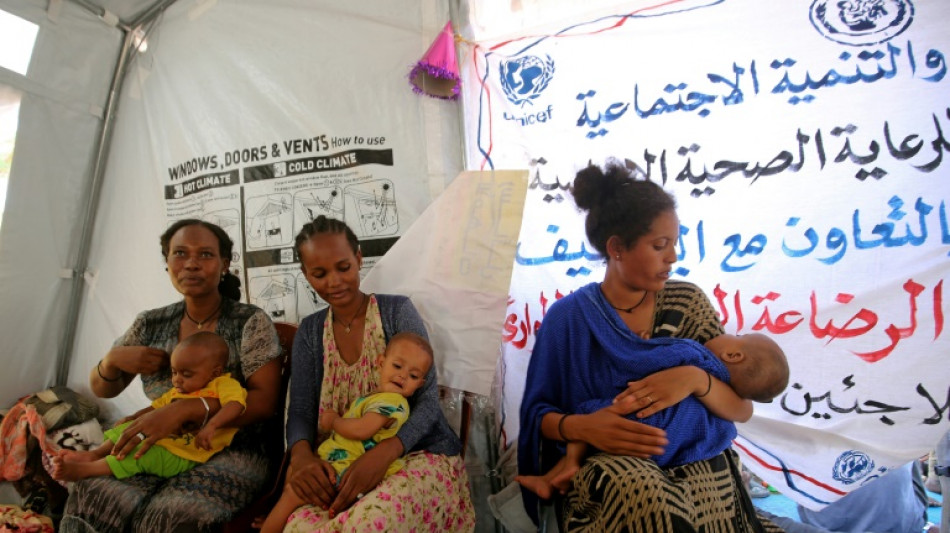
-
 Touadera on path to third presidential term as Central African Republic votes
Touadera on path to third presidential term as Central African Republic votes
-
'Acoustic hazard': Noise complaints spark Vietnam pickleball wars

-
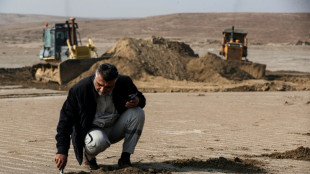 Iraqis cover soil with clay to curb sandstorms
Iraqis cover soil with clay to curb sandstorms
-
Australia's Head backs struggling opening partner Weatherald
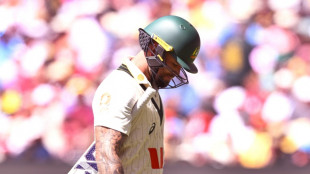
-
 'Make emitters responsible': Thailand's clean air activists
'Make emitters responsible': Thailand's clean air activists
-
Zelensky looks to close out Ukraine peace deal at Trump meet

-
 MCG curator in 'state of shock' after Ashes Test carnage
MCG curator in 'state of shock' after Ashes Test carnage
-
Texans edge Chargers to reach NFL playoffs

-
 Osimhen and Mane score as Nigeria win to qualify, Senegal draw
Osimhen and Mane score as Nigeria win to qualify, Senegal draw
-
Osimhen stars as Nigeria survive Tunisia rally to reach second round

-
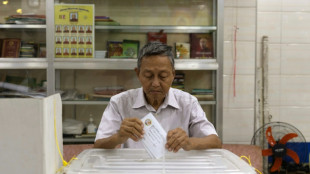 How Myanmar's junta-run vote works, and why it might not
How Myanmar's junta-run vote works, and why it might not
-
Watkins wants to sicken Arsenal-supporting family

-
 Arsenal hold off surging Man City, Villa as Wirtz ends drought
Arsenal hold off surging Man City, Villa as Wirtz ends drought
-
Late penalty miss denies Uganda AFCON win against Tanzania

-
 Watkins stretches Villa's winning streak at Chelsea
Watkins stretches Villa's winning streak at Chelsea
-
Zelensky stops in Canada en route to US as Russia pummels Ukraine
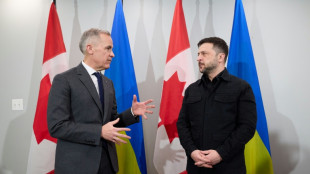
-
 Arteta salutes injury-hit Arsenal's survival spirit
Arteta salutes injury-hit Arsenal's survival spirit
-
Wirtz scores first Liverpool goal as Anfield remembers Jota

-
 Mane rescues AFCON draw for Senegal against DR Congo
Mane rescues AFCON draw for Senegal against DR Congo
-
Arsenal hold off surging Man City, Wirtz breaks Liverpool duck

-
 Arsenal ignore injury woes to retain top spot with win over Brighton
Arsenal ignore injury woes to retain top spot with win over Brighton
-
Sealed with a kiss: Guardiola revels in Cherki starring role

-
 UK launches paid military gap-year scheme amid recruitment struggles
UK launches paid military gap-year scheme amid recruitment struggles
-
Jota's children join tributes as Liverpool, Wolves pay respects

-
 'Tired' Inoue beats Picasso by unanimous decision to end gruelling year
'Tired' Inoue beats Picasso by unanimous decision to end gruelling year
-
Thailand and Cambodia declare truce after weeks of clashes

-
 Netanyahu to meet Trump in US on Monday
Netanyahu to meet Trump in US on Monday
-
US strikes targeted IS militants, Lakurawa jihadists, Nigeria says

-
 Cherki stars in Man City win at Forest
Cherki stars in Man City win at Forest
-
Schwarz records maiden super-G success, Odermatt fourth

-
 Russia pummels Kyiv ahead of Zelensky's US visit
Russia pummels Kyiv ahead of Zelensky's US visit
-
Smith laments lack of runs after first Ashes home Test loss for 15 years

-
 Russian barrage on Kyiv kills one, leaves hundreds of thousands without power
Russian barrage on Kyiv kills one, leaves hundreds of thousands without power
-
Stokes, Smith agree two-day Tests not a good look after MCG carnage

-
 Stokes hails under-fire England's courage in 'really special' Test win
Stokes hails under-fire England's courage in 'really special' Test win
-
What they said as England win 4th Ashes Test - reaction

-
 Hong Kongers bid farewell to 'king of umbrellas'
Hong Kongers bid farewell to 'king of umbrellas'
-
England snap 15-year losing streak to win chaotic 4th Ashes Test

-
 Thailand and Cambodia agree to 'immediate' ceasefire
Thailand and Cambodia agree to 'immediate' ceasefire
-
Closing 10-0 run lifts Bulls over 76ers while Pistons fall

-
 England 77-2 at tea, need 98 more to win chaotic 4th Ashes Test
England 77-2 at tea, need 98 more to win chaotic 4th Ashes Test
-
Somalia, African nations denounce Israeli recognition of Somaliland

-
 England need 175 to win chaotic 4th Ashes Test
England need 175 to win chaotic 4th Ashes Test
-
Cricket Australia boss says short Tests 'bad for business' after MCG carnage

-
 Russia lashes out at Zelensky ahead of new Trump talks on Ukraine plan
Russia lashes out at Zelensky ahead of new Trump talks on Ukraine plan
-
Six Australia wickets fall as England fight back in 4th Ashes Test

-
 New to The Street Show #710 Airs Tonight at 6:30 PM EST on Bloomberg Television
New to The Street Show #710 Airs Tonight at 6:30 PM EST on Bloomberg Television
-
Dental Implant Financing and Insurance Options in Georgetown, TX

-
 Man Utd made to 'suffer' for Newcastle win, says Amorim
Man Utd made to 'suffer' for Newcastle win, says Amorim
-
Morocco made to wait for Cup of Nations knockout place after Egypt advance


One woman dies every 2 mins in pregnancy, childbirth: UN
A woman dies every two minutes due to pregnancy or childbirth complications, despite maternal mortality rates dropping by a third in 20 years, the United Nations said Thursday.
Rates fell significantly between 2000 and 2015 but largely stagnated between 2016 and 2020 -- and in some regions have even reversed, the UN said.
The overall maternal mortality rate dropped by 34.3 percent over a 20-year period -- from 339 maternal deaths per 100,000 live births in 2000 to 223 maternal deaths in 2020, according to a report by the World Health Organization and other UN agencies.
Nonetheless, that means nearly 800 women died per day in 2020 -- or around one every two minutes.
Belarus recorded the biggest decline -- down 95.5 percent -- while Venezuela saw the highest increase. Between 2000 and 2015, the biggest rise was in the United States.
"While pregnancy should be a time of immense hope and a positive experience for all women, it is tragically still a shockingly dangerous experience for millions around the world," said WHO chief Tedros Adhanom Ghebreyesus.
"These new statistics reveal the urgent need to ensure every woman and girl has access to critical health services... and that they can fully exercise their reproductive rights."
The report found that between 2016 and 2020, maternal mortality rates dropped in only two of the eight UN regions: in Australia and New Zealand by 35 percent, and in Central and Southern Asia by 16 percent.
- 'Unconscionable' -
The rate went up in Europe and Northern America by 17 percent, and in Latin America and the Caribbean by 15 percent. Elsewhere, it stagnated.
The two European countries witnessing "significant increases" are Greece and Cyprus, the report's author Jenny Cresswell told journalists.
Maternal deaths remain largely concentrated in the world's poorest regions and in conflict-affected countries.
Around 70 percent of those deaths recorded in 2020 were in sub-Saharan Africa, where the rate is "136 times bigger" than in Australia and New Zealand, Cresswell said.
In Afghanistan, the Central African Republic, Chad, the Democratic Republic of Congo, Somalia, South Sudan, Sudan, Syria and Yemen -- all facing severe humanitarian crises -- rates were more than twice the global average.
Severe bleeding, infections, complications from unsafe abortions and underlying conditions such as HIV/AIDS are among the leading causes of death, the report said -- which are all largely preventable and treatable.
The WHO said it was "critical" that women had control over their reproductive health -- particularly about if and when to have children, so that they can plan and space childbearing to protect their health.
Natalia Kanem, head of the UN Population Fund, said the rate of women "needlessly" dying was "unconscionable".
"We can and must do better by urgently investing in family planning and filling the global shortage of 900,000 midwives," she said.
While the report covers data up to 2020, the WHO's Anshu Banerjee told journalists that the statistics since then look bleak, due to the Covid-19 pandemic and the economic crisis.
A.Jones--AMWN



